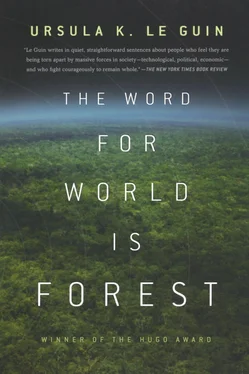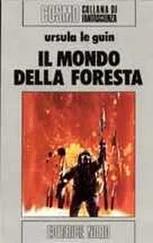“Turkey, Flapfeet, Weteyes,” said Reswan, the ex-slave.
“Turkey’s alive? Good. Help me get up, Greda, I have eels for bones….”
When he had been afoot a while he was stronger, and within the hour he set off for Eshsen, two hours’ walk from Endtor.
When they came Reswan mounted a ladder set against the compound wall and bawled in the pidgin-English taught the slaves, “Dong-a come to gate hurry-up-quick!”
Down in the alleys between the squat cement barracks, some of the yumens yelled and threw clods of dirt at him. He ducked, and waited.
The old Colonel did not come out, but Gosse, whom they called Weteyes, came limping out of a hut and called up to Reswan, “Colonel Dongh is ill, he cannot come out.”
“Ill what kind?”
“Bowels, water-illness. What you want?”
“Talk-talk.—My lord god,” Reswan said in his own language, looking down at Selver, “the Turkey’s hiding, do you want to talk with Weteyes?”
“All right.”
“Watch the gate here, you bowmen!—To gate, Mis-ter Goss-a, hurry-up-quick!”
The gate was opened just wide enough and long enough for Gosse to squeeze out. He stood in front of it alone, facing the group by Selver. He favored one leg, injured on the Night of Eshsen. He was wearing torn pajamas, mudstained and rain-sodden. His graying hair hung in lank festoons around his ears and over his forehead. Twice the height of his captors, he held himself very stiff, and stared at them in courageous, angry misery. “What you want?”
“We must talk, Mr. Gosse,” said Selver, who had learned plain English from Lyubov. “I’m Selver of the Ash Tree of Eshreth. I’m Lyubov’s friend.”
“Yes, I know you. What have you to say?”
“I have to say that the killing is over, if that be made a promise kept by your people and my people. You may all go free, if you will gather in your people from the logging camps in South Sornol, Kushil, and Rieshwel, and make them all stay together here. You may live here where the forest is dead, where you grow your seed-grasses. There must not be any more cutting of trees.”
Gosse’s face had grown eager: “The camps weren’t attacked?”
“No.”
Gosse said nothing.
Selver watched his face, and presently spoke again: “There are less than two thousand of your people left living in the world, I think. Your women are all dead. In the other camps there are still weapons; you could kill many of us. But we have some of your weapons. And there are more of us than you could kill. I suppose you know that, and that’s why you have not tried to have the flying ships bring you fire-throwers, and kill the guards, and escape. It would be no good; there really are so many of us. If you make the promise with us it will be much the best, and then you can wait without harm until one of your Great Ships comes, and you can leave the world. That will be in three years, I think.”
“Yes, three local years—How do you know that?”
“Well, slaves have ears, Mr. Gosse.”
Gosse looked straight at him at last. He looked away, fidgeted, tried to ease his leg. He looked back at Selver, and away again. “We had already ‘promised’ not to hurt any of your people. It’s why the workers were sent home. It did no good, you didn’t listen—”
“It was not a promise made to us.”
“How can we make any sort of agreement or treaty with a people who have no government, no central authority?”
“I don’t know. I’m not sure you know what a promise is. This one was soon broken.”
“What do you mean? By whom, how?”
“In Rieshwel, New Java. Fourteen days ago. A town was burned and its people killed by yumens of the Camp in Rieshwel.”
“It’s a lie. We were in radio contact with New Java right along, until the massacre. Nobody was killing natives there or anywhere else.”
“You’re speaking the truth you know,” Selver said, “I speak the truth I know. I accept your ignorance of the killings on Rieshwel; but you must accept my telling you that they were done. This remains: the promise must be made to us and with us, and it must be kept. You’ll wish to talk about these matters with Colonel Dongh and the others.”
Gosse moved as if to re-enter the gate, then turned back and said in his deep, hoarse voice, “Who are you, Selver? Did you—was it you that organized the attack? Did you lead them?”
“Yes, I did.”
“Then all this blood is on your head,” Gosse said, and with sudden savagery, “Lyubov’s too, you know. He’s dead—your ‘friend Lyubov.’”
Selver did not understand the idiom. He had learned murder, but of guilt he knew little beyond the name. As his gaze locked for a moment with Gosse’s pale, resentful stare, he felt afraid. A sickness rose up in him, a mortal chill. He tried to put it away from him, shutting his eyes a moment. At last he said, “Lyubov is my friend, and so not dead.”
“You’re children,” Gosse said with hatred. “Children, savages. You have no conception of reality. This is no dream, this is real! You killed Lyubov. He’s dead. You killed the women—the women —you burned them alive, slaughtered them like animals!”
“Should we have let them live?” said Selver with vehemence equal to Gosse’s, but softly, his voice singing a little. “To breed like insects in the carcass of the World? To overrun us? We killed them to sterilize you. I know what a realist is, Mr. Gosse. Lyubov and I have talked about these words. A realist is a man who knows both the world and his own dreams. You’re not sane: there’s not one man in a thousand of you who knows how to dream. Not even Lyubov and he was the best among you. You sleep, you wake and forget your dreams, you sleep again and wake again, and so you spend your whole lives, and you think that is being, life, reality! You are not children, you are grown men, but insane. And that’s why we had to kill you, before you drove us mad. Now go back and talk about reality with the other insane men. Talk long, and well!”
The guards opened the gate, threatening the crowding yumens inside with their spears; Gosse re-entered the compound, his big shoulders hunched as if against the rain.
Selver was very tired. The headwoman of Berre and another woman came to him and walked with him, his arms over their shoulders so that if he stumbled he should not fall. The young hunter Greda, a cousin of his Tree, joked with him, and Selver answered light-headedly, laughing. The walk back to Endtor seemed to go on for days.
He was too weary to eat. He drank a little hot broth and lay down by the Men’s Fire. Endtor was no town but a mere camp by the great river, a favorite fishing place for all the cities that had once been in the forest round about, before the yumens came. There was no Lodge. Two fire-rings of black stone and a long grassy bank over the river where tents of hide and plaited rush could be set up, that was Endtor. The river Menend, the master river of Sornol, spoke ceaselessly in the world and in the dream at Endtor.
There were many old men at the fire, some whom he knew from Broter and Tuntar and his own destroyed city Eshreth, some whom he did not know; he could see in their eyes and gestures, and hear in their voices, that they were Great Dreamers; more dreamers than had ever been gathered in one place before, perhaps. Lying stretched out full length, his head raised on his hands, gazing at the fire, he said, “I have called the yumens mad. Am I mad myself?”
“You don’t know one time from the other,” said old Tubab, laying a pine-knot on the fire, “because you did not dream either sleeping or waking for far too long. The price for that takes long to pay.”
“The poisons the yumens take do much the same as does the lack of sleep and dream,” said Heben, who had been a slave both at Central and at Smith Camp. “The yumens poison themselves in order to dream. I saw the dreamer’s look in them after they took the poisons. But they couldn’t call the dreams, nor control them, nor weave nor shape nor cease to dream; they were driven, overpowered. They did not know what was within them at all. So it is with a man who hasn’t dreamed for many days. Though he be the wisest of his Lodge, still he’ll be mad, now and then, here and there, for a long time after. He’ll be driven, enslaved. He will not understand himself.”
Читать дальше




